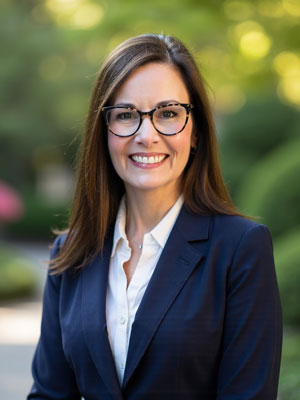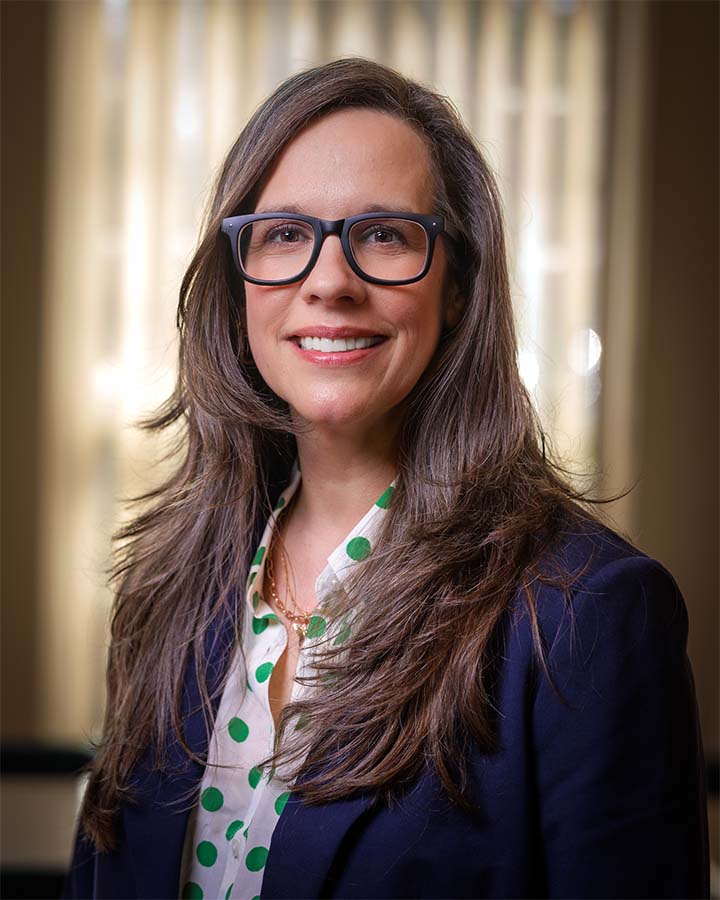WilmU One-on-One: An Interview About the New Delaware Nurse Anesthesiology Program

The Directors Discuss Patient Care, Clinical Partnerships and Career Prospects
A compassionate clinician, accomplished academic and ardent advocate, Dr. Jacqueline Mainwaring leads the new Delaware Nurse Anesthesiology Program, a collaboration between Wilmington University and ChristianaCare with support from Anesthesia Services, P.A. She and Dr. Leslie Jackson, who brings nearly two decades of experience to her role as assistant director, are certified registered nurse anesthetists (CRNAs) committed to launching the next generation of doctorally prepared health care leaders.
Q: What inspired you to become a CRNA and then an educator?

Dr. Jacqueline Mainwaring: I was drawn to nurse anesthesiology because of the autonomy, complexity and critical thinking it demands. Over the years, I found deep satisfaction in caring for patients across diverse, high-acuity settings. As my career progressed, I naturally gravitated toward mentoring others. Becoming an educator allowed me to combine clinical excellence with a passion for shaping the next generation of CRNAs. I find immense fulfillment in helping students grow into confident, capable professionals.
Dr. Leslie Jackson: As a young nurse, I loved being bedside and managing challenging situations. As I explored various advanced practice options, I had the opportunity to shadow a CRNA. I knew immediately that it was the specialty that suited me best.
I’ve worked clinically with students my whole career. Teaching reminds me regularly how blessed I am to be a CRNA. Sharing my love of anesthesia with students is incredibly fulfilling. Attending anesthesia school requires a huge sacrifice, and supporting these amazing students through the process is so rewarding.
Q: Can you describe your role in developing the Delaware Nurse Anesthesiology Program (DNAP)?

J.M.: As the director of the Delaware Nurse Anesthesiology Program, I have led every aspect of the program’s development — from curriculum design and faculty recruitment to accreditation preparation and clinical site partnership acquisition. Creating this program has been a collaborative effort with Wilmington University; Anesthesia Services, P.A.; and ChristianaCare, driven by a shared commitment to expand access to high-quality nurse anesthesiology education while addressing the growing demand for CRNAs in our state and region.
L.J.: I started with DNAP in early March and participated in our accreditation site visit. In the short term, I am working closely with Dr. Mainwaring to conduct information sessions, open the application and organize upcoming interviews. We are planning the first semester coursework, skills labs and simulations. Solidifying our long-term plan for the subsequent semesters is ongoing. The program is well developed and well supported.
Q: How will the DNAP impact patient care?
J.M.: The DNAP will have a direct and lasting impact on patient care by graduating nurse anesthetists who are clinically excellent, evidence-based and prepared to meet the needs of complex patients. By training CRNAs locally, we’re also helping to strengthen Delaware’s health care workforce and ensure continuity of care in our communities. Many of our graduates will go on to serve in the same systems where they trained — bringing both expertise and familiarity with the populations they serve.
L.J.: Providing a training program in this area will help address the significant CRNA shortages facing our local hospitals and health systems.
Q: How does the DNAP curriculum prepare students for the complexities of anesthesia practice?
J.M.: Our curriculum is intentionally rigorous and integrates didactic coursework, problem-based learning, high-fidelity simulation, skills labs, and extensive clinical experiences across the lifespan and specialties. We emphasize not only technical skill but also clinical reasoning, crisis management, interprofessional collaboration, professional advocacy and cultural competence. The program is structured to build progressive responsibility and autonomy so that by graduation, students are prepared to practice at the full scope of the CRNA role.
L.J.: The College of Health Professions & Natural Sciences at Wilmington University offers students an incredibly robust academic experience. We are working internally, as well as with other divisions, to ensure that we surpass curriculum standards.
We are uniquely positioned to have incredible clinical rotations. Our clinical partners offer students case volume that will exceed required experiences. Additionally, our students will have access to a state-of-the-art simulation center as part of our collaboration with ChristianaCare.
“This program was built with intention — from the curriculum to the clinical partnerships — to prepare students for excellence in nurse anesthesiology practice.”
— Dr. Jacqueline Mainwaring
Q: What would you like prospective students to know about this program?
J.M.: This program was built with intention — from the curriculum to the clinical partnerships — to prepare students for excellence in nurse anesthesiology practice. We are committed to student success and well-being. Students will be surrounded by faculty who are passionate about education, practice and advocacy. While this will be one of the most challenging undertakings of their career, it will also be one of the most rewarding.
L.J.: The rich academic experience Dr. Mainwaring brings is enormously valuable. She and I have served professionally in a variety of leadership roles. We both have decades of clinical experience. We have cultivated long-standing relationships with our clinical partners. Wilmington University, ChristianaCare and Anesthesia Services, P.A. are very invested in the success of our students and the program.
Q: What do you find most rewarding about working with students?
J.M.: Watching students evolve — from anxious beginners to confident, competent clinicians — is incredibly rewarding. I love seeing them connect theory to practice, advocate for patients and find their voice as leaders. It’s a privilege to walk alongside them during such a transformative time in their professional journey.
L.J.: I love watching them grow academically and clinically. The transformation throughout training is remarkable.
Q: What advice would you give to students pursuing careers in nurse anesthesiology?
J.M.: Stay curious, stay humble and remember that learning never stops. Nurse anesthesiology demands excellence but also adaptability and resilience. Seek mentors, ask questions and commit fully to every opportunity to grow — both clinically and personally. And always, center your practice on patient safety and compassion.
L.J.: I suggest current ICU experience — one year is required; two is preferred. Review the various programs in our area and understand the admission requirements. Ensure that you have a strong support system. Program acceptance is competitive, but the demand for CRNAs is high.
Q: What do you love about Wilmington University?
J.M.: Wilmington University offers a supportive, student-centered environment that values innovation, access and community impact. As a faculty member, I appreciate the collaborative spirit and flexibility that allow us to design programs that meet real-world needs. It’s exciting to be part of an institution that truly lives its mission.
L.J.: I love many things about Wilmington University. The warm welcome I’ve received has been so appreciated, and it is clear the University values the faculty. The “student-first” culture is threaded throughout everything we do. Our leaders are approachable. The encouragement for our program and for me as a new faculty member has been remarkable. The assistance provided by the teams that support our program has been outstanding.
Become a certified registered nurse anesthetist (CRNA) and add your talents to this critical field with a Doctor of Nursing Practice degree in Nurse Anesthesiology from Wilmington University.



